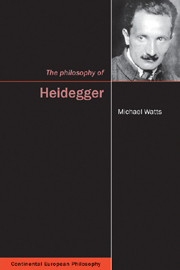Book contents
- Frontmatter
- Contents
- Preface
- Abbreviations
- 1 Heidegger's life
- 2 The meaning of life: the question of Being
- 3 The central ideas in Being and Time
- 4 Conscience, guilt and authenticity
- 5 Being-towards-death
- 6 Dasein's primordial temporality
- 7 The “truth of alētheia” and language
- 8 Heidegger on poetry, poets and Hölderlin
- 9 Heidegger on art
- 10 Heidegger on technology
- 11 Tao, Zen and Heidegger
- 12 Heidegger's politics
- Glossary
- Further reading
- Bibliography
- Index
8 - Heidegger on poetry, poets and Hölderlin
- Frontmatter
- Contents
- Preface
- Abbreviations
- 1 Heidegger's life
- 2 The meaning of life: the question of Being
- 3 The central ideas in Being and Time
- 4 Conscience, guilt and authenticity
- 5 Being-towards-death
- 6 Dasein's primordial temporality
- 7 The “truth of alētheia” and language
- 8 Heidegger on poetry, poets and Hölderlin
- 9 Heidegger on art
- 10 Heidegger on technology
- 11 Tao, Zen and Heidegger
- 12 Heidegger's politics
- Glossary
- Further reading
- Bibliography
- Index
Summary
Poetry: the primordial essence of language
Heidegger uses the term “Poesie” to refer solely to verse or poetry. He also sometimes employs the German word “Dichtung” (from “dichten”, “to write, invent, compose verses”); it can be used to refer to poetry or verse, as well as to the entire field of creative writing, including novels. He normally uses this word in a wider sense, to refer to the act of invention, creation or projection, but he also sometimes uses Dichtung (and dichten) in a narrow sense, to refer purely to poetry or verse.
Heidegger points out that “Language itself is poetry [Dichtung] in the essential sense” (OWA: 74); his use of Dichtung here refers to the wider sense of the word – “creative projection”. Heidegger means here that language is not only a means of communicating what we already know, but also serves another far more important purpose. The essence of language – its primordial, most important function – is “projective saying” (ibid.), the naming of things for the first time that opens up a new realm of communication through bringing what is, as something that is, into the open for the first time. “Language, by naming beings for the first time, first brings beings to word and to appearance. Only this naming nominates beings to their being from out of their being” (OWA: 73).
- Type
- Chapter
- Information
- The Philosophy of Heidegger , pp. 175 - 197Publisher: Acumen PublishingPrint publication year: 2011



